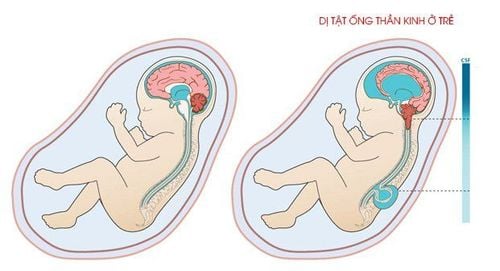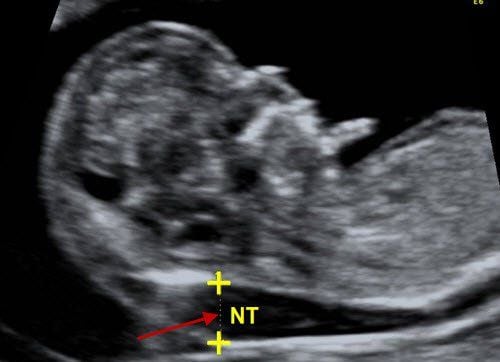This is an automatically translated article.
Neural tube birth defects are defects in the brain and spine that cause the fetus to develop abnormally. These defects leave a heavy impact on children's physical and mental health. This is a serious problem that pregnant women need to be aware of.1. The process of developing fetal neural tube
During the first month of pregnancy, the embryo develops a tissue structure, called a neural tube. This is the core foundation for the later development of the nervous system. Specifically, from the neural tube will develop into the brain, skull, spinal cord, spine. This development takes place around the 3rd week of pregnancy, usually from the 18th day, the neural tube will gradually close and by the 28th day the neural tube will be completely closed.2. What causes neural tube defects?
The development of the neural tube is very complex. It needs to be provided with a certain amount of folic acid to be completely closed. If the mother's body does not have enough folic acid to supply the neural tube, the neural tube will not be able to close, thereby causing birth defects such as cleft lip, cleft palate, heart problems pulse, paralysis, spina bifida, hydrocephalus ... more serious is death.Because the development of the neural tube takes place very early in the first month of pregnancy, if the mother is deficient in folic acid at this time, the fetus has a very high risk of congenital neural tube defects. .

Nếu người mẹ thiếu hụt axit folic trong tháng đầu tiên thì thai nhi có nguy cơ bị dị tật ống thần kinh bẩm sinh rất cao.
3. Types of neural tube birth defects in fetus
Neural tube birth defects are defects in the brain and spine. The most common congenital neural tube defects are spina bifida and anencephaly.3.1. Spina bifida This is the effect of the neural tube on the spinal cord. During development, the neural tube does not close completely, causing damage to the spinal cord inside.
Individuals with spinal bifida are often affected as nerve paralysis below the damaged spinal cord. This makes it difficult for the patient to move, even paralyzed. In addition, in this case, the child may also have problems with increased intracranial pressure and urinary incontinence. There are cases of children dying after birth due to severe spinal split.
3.2. Anencephaly This is a very serious type of neural tube defect. When there is craniocervical defect, the baby's brain barely develops. The cases of craniocervical defects were stillborn in the uterus or died shortly after birth.
4. Test to detect neural tube defects in the fetus
Fetal malformation testing is done between 12-13 weeks and 18-20 weeks of pregnancy. Called double test and triple test. These tests help identify problems with your child's development. Through these tests, spina bifida can be detected.If the fetus is found to have a neural tube defect, the doctor can give two suggestions:
Continue the pregnancy and guide the baby after birth. Termination of pregnancy.
5. How to prevent neural tube defects in fetus

Bổ sung Axit Folic ngay từ khi có ý định mang thai để ngăn ngừa nguy cơ dị tật ống thần kinh ở thai nhi
The neural tube develops during the first month of pregnancy, when the mother does not know she is pregnant. Therefore, to prevent neural tube defects in the fetus, women need to supplement folic acid right from the time they intend to become pregnant. Providing enough folic acid helps pregnant women reduce the risk of miscarriage, premature birth, low birth weight baby. This is a very important nutrient for the development of the fetus, especially in the first 3 months of pregnancy. The results of medical studies show that adequate folic acid supplementation from the time of conception will reduce the risk of neural tube defects by 93%.
According to a survey by the World Health Organization and the Vietnam Institute of Nutrition conducted in August 2008, up to 53% of Vietnamese women of reproductive age have blood folic acid levels below the maximum threshold. for the prevention of neural tube defects in the fetus. That means 1 in 2 Vietnamese women will have a chance of having a baby with a neural tube defect.
The cause of folic acid deficiency may be due to a lack of variety in the diet, not eating a lot of foods containing folic acid, poor absorption, improper processing of dishes leading to folic acid loss...
Women in the first 3 months or right from the time they intend to become pregnant should take folic acid supplements through synthetic tablets to ensure they have enough folic acid levels needed, to prevent the risk of congenital neural tube defects. in the fetus.
If you have unusual symptoms, you should be examined and consulted with a specialist.
Please dial HOTLINE for more information or register for an appointment HERE. Download MyVinmec app to make appointments faster and to manage your bookings easily.













